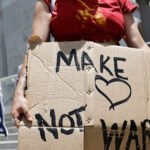by D Gorman
Part -2
When that was over, I started to write the day’s lesson on the chalkboard, but the Cornwell boy, who never missed an opportunity to derail classroom progress, asked if Billy had smuggled the flag in from Portland or one of the other ‘No-Go Zones’. Everyone gasped. As far as my class was concerned, anything from Portland must be radioactive. So for the second time in a month, I had to drag the Geiger counter out from the art closet. I knew it was a waste of time but it had to be done. Even first-year teachers will tell you, there’s no way you can get kids to focus if they think they are being exposed to radiation.
By the time I packed the Geiger counter away, I had lost so much time that I’d be lucky to get to the first vocabulary hand-out. Meanwhile, the Patriotism Officer had taken up permanent residence at my desk, his presence an implicit threat that any more subversive behavior would be handled swiftly and with extreme prejudice. I appreciated the calming effect this had on the class and began my lecture on one of our most important patriotic traditions—voting for the President.
These students have been voting since kindergarten, but the new law lowering the voting age to the third trimester had just been passed, and State Ed.’s updated curriculum made it my responsibility to teach the students that voting from birth was how things have always been. Not an easy task with such an inquisitive group, not to mention the added pressure of the P.O. scrutinizing my every word.
My heart rate jumped when the Dugan boy raised his hand. Dugan was one of those irritatingly clever kids who loved getting a rise out of his teachers. I thought for sure he was going to insist he hadn’t voted before kindergarten, and the others would agree and then the P.O. would narrow his eyes and probably notice the smashed dioramas, and then I’m the one getting dragged out of here kicking and screaming.
To my relief, he asked how anyone was supposed to make an informed decision at such a young age. I told him if he did his homework more often, maybe he’d be better informed. The P.O. got a good chuckle out of that one.
Then the Wenerstadt boy asked who the President’s opponent was and did he have a strong political platform. I didn’t even have a chance to make up an answer before the P.O. got him out of there too.
Maybe it was because so many of their classmates had been removed at that point, but after the P.O. took Wenerstadt, a hush fell over the remaining students. At first I thought it was just fear, but as I moved around the room handing out vocab sheets, I sensed a solemnity to the silence that suggested a change had occurred, like a door to some greater understanding had started to swing open.
Then someone asked if there was a difference between patriotism and nationalism, which were two of our vocabulary words. I said sure, patriotism is pride in one’s country, whereas nationalism is the belief that your national culture is superior to others—
—And they said that the line between the two gets a little fuzzy sometimes.
And I said the voters have an ethical obligation to the republic and to each other to reject leaders espousing nationalistic ideals, lest we risk our democracy crumbling under the fascistic impulses of power-hungry demagogues. Nobody wants to end up like Equatorial Guinea.
And they asked how political movements can ever succeed in overthrowing entrenched authoritarian regimes.
And I said they must capture the hearts of the proletariat.
And they asked if it’s the proletariat who suffer most, why do they support leaders who keep them in metaphorical chains?
And I said because the ruling class has papered their cages with the trappings of patriotism and convinced them that the bars in which they are confined are the only thing keeping them safe—
—And then the P.O. returned, and one of the boys in the back of the class farted and everyone had a nice laugh.
Class was nearly over and I was feeling pretty defeated about how unproductive the day had been. Then Cindy Fontaine asked why the President’s face wasn’t on Mount Rushmore. Poor girl must have gotten one of the really old textbooks at the beginning of the year. I shot the P.O. an embarrassed look and confiscated it.
That’s when it happened—one of those ‘Aha!’ moments that every good teacher experiences from time to time.
“Let’s have a field trip”, I announced. I led the students out to the parking lot, where we set fire to Cindy’s book, just like the faculty do at the monthly parent-teacher conferences when the parents tell us which books are too offensive to have in schools. The kids were thrilled about getting to do something so grown-up and patriotic, and even the P.O. must have been impressed because he was nice enough to discreetly remove Cindy before we re-entered the building, so the children could enjoy the experience without distraction.
I was feeling positively buoyant when we returned to the classroom, so swept up in the energy of the children chattering excitedly about the book burning that I almost didn’t notice that the hamster was back in its cage. I announced the good news, but none of the children seemed to care. They had forgotten all about the hamster and Billy Finn’s flag and everything else that had happened. When the bell rang they were still talking about what a great lesson it had been, which is really what this job is all about. Every day it becomes harder to remember why we do this job, but then you have one of those rare days where you find a way to truly connect with your students and get them excited about learning and, man, there’s no better feeling in the world.







